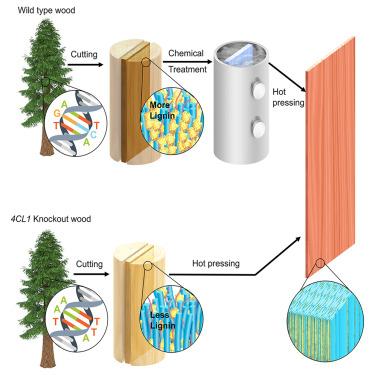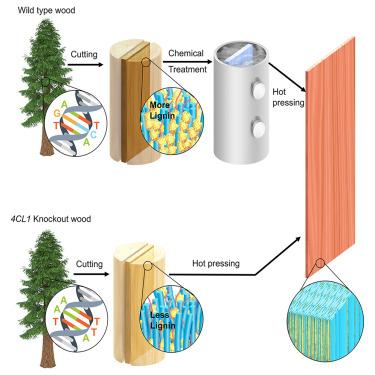经过基因组编辑的高性能人造木材
IF 17.3
1区 材料科学
Q1 MATERIALS SCIENCE, MULTIDISCIPLINARY
引用次数: 0
摘要
用高性能工程木材替代传统结构材料可以减少二氧化碳排放,提高碳固存效果。传统方法涉及高能耗的化学处理,以降低木质素含量,从而获得密度更大、机械性能更优的木材,但却引发了可持续发展的担忧。这项研究引入了一种基因组编辑方法来减少树木中的木质素,从而实现先进工程木材的无化学处理。利用胞嘧啶碱基编辑器 nCas9-A3A/Y130F,以杨木中的 4CL1 基因为目标,实现了 12.8% 的木质素减少。这有助于通过水浸和热压生产出无废料的致密木材,其抗拉强度为 313.6 ± 6.4 兆帕,与铝合金 6061 相当。致密化 4CL1 基因敲除木材的强度与传统处理木材的强度(320.2 ± 3.5 兆帕)非常接近,这证明了基因改造在制造可持续、高性能工程木材方面的有效性,并有助于减少二氧化碳排放和保护环境。本文章由计算机程序翻译,如有差异,请以英文原文为准。


Genome-edited trees for high-performance engineered wood
Replacing conventional structural materials with high-performance engineered wood can reduce CO2 emissions and enhance carbon sequestration. Traditional methods involve energy-intensive chemical treatments to reduce lignin content, resulting in denser, mechanically superior wood but raising sustainability concerns. This work introduces a genome-editing approach to reduce lignin in trees, enabling chemical-free processing of advanced engineered wood. Using the cytosine base editor nCas9-A3A/Y130F, the 4CL1 gene in poplar wood was targeted, achieving a 12.8% lignin reduction. This facilitated waste-free densified wood production through water immersion and hot pressing, yielding a tensile strength of 313.6 ± 6.4 MPa, comparable to aluminum alloy 6061. The strength of densified 4CL1 knockout wood closely matched that of traditionally treated wood (320.2 ± 3.5 MPa), demonstrating the effectiveness of genetic modification in creating sustainable, high-performance engineered wood and contributing to reduced CO2 emissions and environmental conservation.
求助全文
通过发布文献求助,成功后即可免费获取论文全文。
去求助
来源期刊

Matter
MATERIALS SCIENCE, MULTIDISCIPLINARY-
CiteScore
26.30
自引率
2.60%
发文量
367
期刊介绍:
Matter, a monthly journal affiliated with Cell, spans the broad field of materials science from nano to macro levels,covering fundamentals to applications. Embracing groundbreaking technologies,it includes full-length research articles,reviews, perspectives,previews, opinions, personnel stories, and general editorial content.
Matter aims to be the primary resource for researchers in academia and industry, inspiring the next generation of materials scientists.
 求助内容:
求助内容: 应助结果提醒方式:
应助结果提醒方式:


